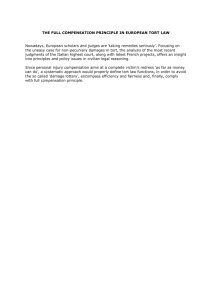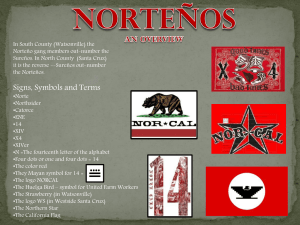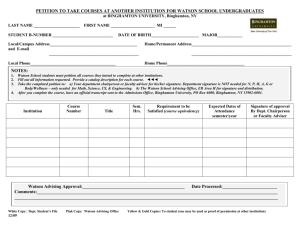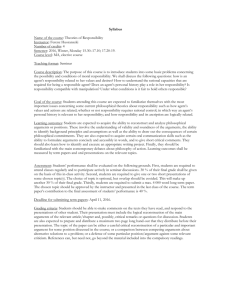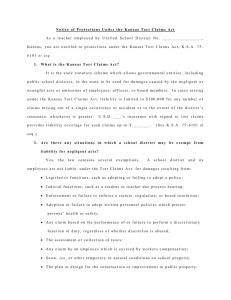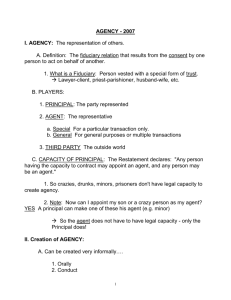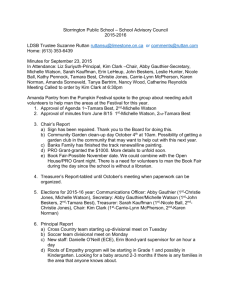Practice Test
advertisement
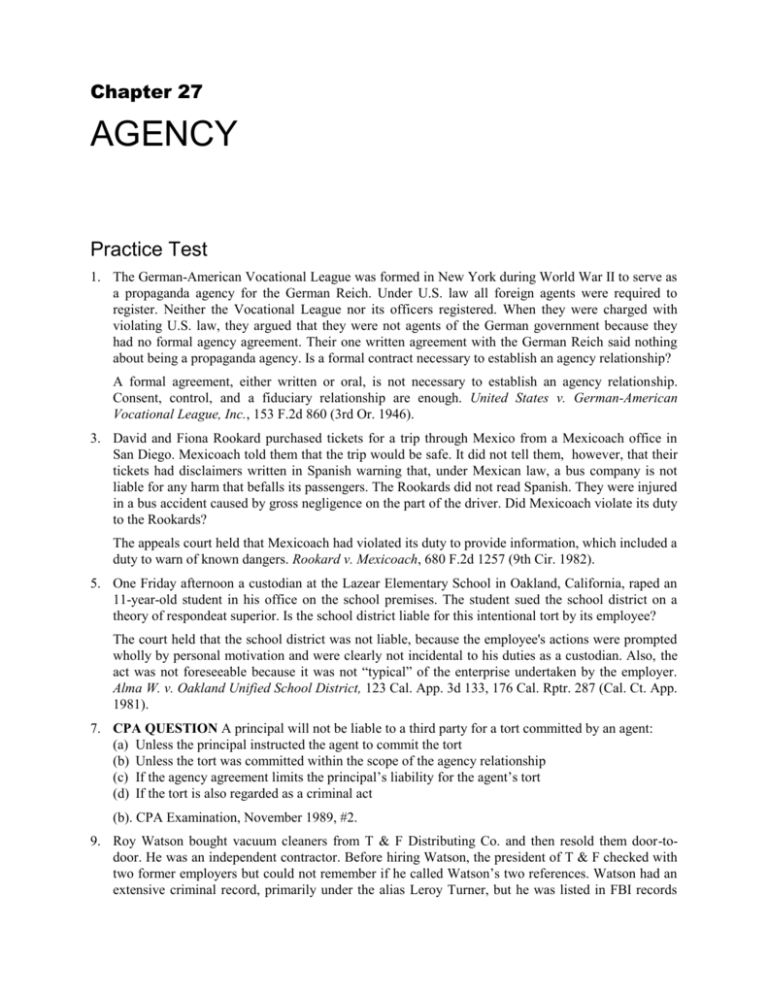
Chapter 27 AGENCY Practice Test 1. The German-American Vocational League was formed in New York during World War II to serve as a propaganda agency for the German Reich. Under U.S. law all foreign agents were required to register. Neither the Vocational League nor its officers registered. When they were charged with violating U.S. law, they argued that they were not agents of the German government because they had no formal agency agreement. Their one written agreement with the German Reich said nothing about being a propaganda agency. Is a formal contract necessary to establish an agency relationship? A formal agreement, either written or oral, is not necessary to establish an agency relationship. Consent, control, and a fiduciary relationship are enough. United States v. German-American Vocational League, Inc., 153 F.2d 860 (3rd Or. 1946). 3. David and Fiona Rookard purchased tickets for a trip through Mexico from a Mexicoach office in San Diego. Mexicoach told them that the trip would be safe. It did not tell them, however, that their tickets had disclaimers written in Spanish warning that, under Mexican law, a bus company is not liable for any harm that befalls its passengers. The Rookards did not read Spanish. They were injured in a bus accident caused by gross negligence on the part of the driver. Did Mexicoach violate its duty to the Rookards? The appeals court held that Mexicoach had violated its duty to provide information, which included a duty to warn of known dangers. Rookard v. Mexicoach, 680 F.2d 1257 (9th Cir. 1982). 5. One Friday afternoon a custodian at the Lazear Elementary School in Oakland, California, raped an 11-year-old student in his office on the school premises. The student sued the school district on a theory of respondeat superior. Is the school district liable for this intentional tort by its employee? The court held that the school district was not liable, because the employee's actions were prompted wholly by personal motivation and were clearly not incidental to his duties as a custodian. Also, the act was not foreseeable because it was not “typical” of the enterprise undertaken by the employer. Alma W. v. Oakland Unified School District, 123 Cal. App. 3d 133, 176 Cal. Rptr. 287 (Cal. Ct. App. 1981). 7. CPA QUESTION A principal will not be liable to a third party for a tort committed by an agent: (a) Unless the principal instructed the agent to commit the tort (b) Unless the tort was committed within the scope of the agency relationship (c) If the agency agreement limits the principal’s liability for the agent’s tort (d) If the tort is also regarded as a criminal act (b). CPA Examination, November 1989, #2. 9. Roy Watson bought vacuum cleaners from T & F Distributing Co. and then resold them door-todoor. He was an independent contractor. Before hiring Watson, the president of T & F checked with two former employers but could not remember if he called Watson’s two references. Watson had an extensive criminal record, primarily under the alias Leroy Turner, but he was listed in FBI records under both Leroy Turner and Roy Watson. T & F granted Watson sales territory that included Neptune City, New Jersey. This city required that all “peddlers” such as Watson be licensed. Applicants for this license were routinely fingerprinted. T & F never insisted that Watson apply for such a license. Watson attacked Miriam Bennett after selling a vacuum cleaner to her at her home in Neptune City. Is T & F liable to Bennett? Bennett alleged that the company was liable for the assault committed by its independent contractor because it had been negligent in hiring him. The appeals court held for Bennett on the grounds that she was entirely innocent, whereas T & F could have prevented the injury by being more careful during the hiring process. Bennett v. T & F Distrib. Co., 117 N.J. Super. 439, 285 A.2d 59 (N.J. 1971). 11. Jack and Rita Powers purchased 312 head of cattle at an auction conducted by Coffeyville Livestock Sales Co. They did not know who owned the cattle they bought. The Powers, in turn, sold 159 of this lot to Leonard Hoefling. He sued the Powers, alleging the cattle were diseased and dying in large numbers, and recovered $38,360. Are the Powers entitled to reimbursement from Coffeyville? Yes. Coffeyville, the auctioneer was liable as a seller, since it did not disclose to the buyer the identity of the principal. Powers v. Coffeyville Livestock Sales Co., 665 F.2d 311 (10th Cir. 1981).

